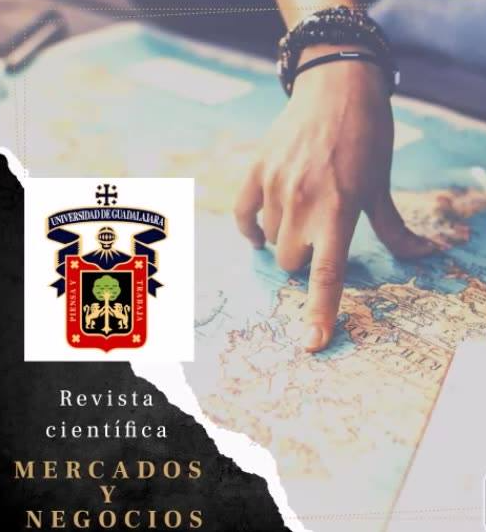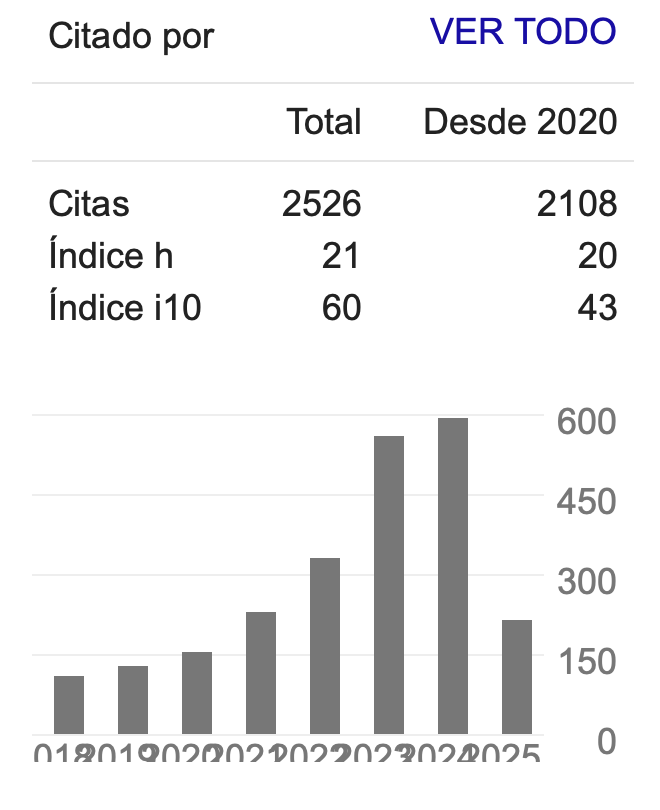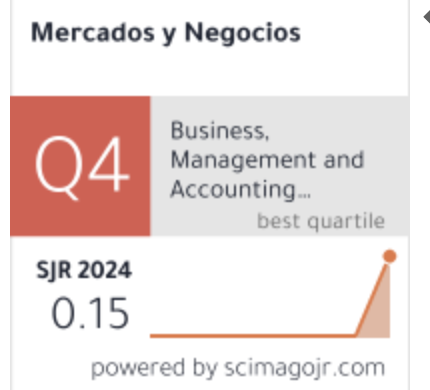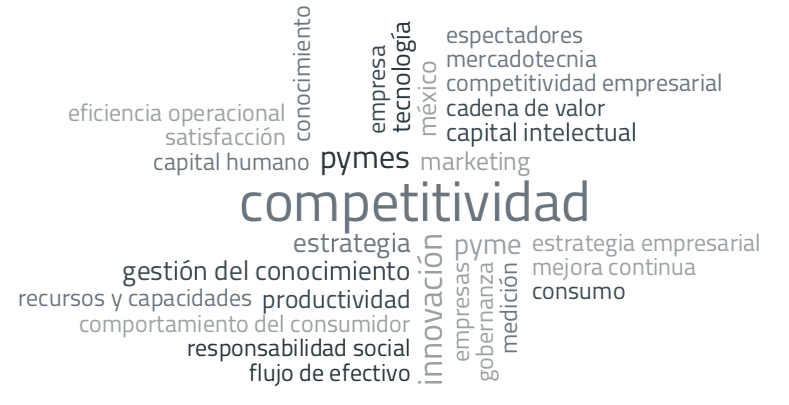The resilience of corporate tourism: bleisure, digitalization, and sustainability
DOI:
https://doi.org/10.32870/myn.vi48.7679Keywords:
corporate tourism, COVID, Resilience, digital transformationAbstract
The study aims to analyze the resilience of corporate tourism in the last three years. Interviews were conducted with industry professionals, and a questionnaire was applied to corporate clients. The results show that adaptation was achieved through short-term planning, bleisure tourism, digitalization, and sustainability. The main conclusion is that resilient companies have changed their line of business, accepted to operate in the short term, and offered more flexibility in pricing.References
Adekola, J., & Clelland, D. (2020). Two sides of the same coin: Business resilience and community resilience. Journal of Contingencies and Crisis Management, 28(1), 50-60.
Basile, G., & Dominici, G. (2016). A complex adaptive system framework for management and marketing studies. In Chaos, Complexity and Leadership (83-97). Springer, Cham
Belén, C. (2013). Turismo de Negocios. Tesis para obtener el grado de la Licenciatura en Turismo. Buenos Aires: Universidad Abierta Interamericana.
Belitski, M., Guenther, C., Kritikos, A. & Thurik, R. (2022). Economic effects of the COVID-19 pandemic on entrepreneurship and small businesses. Small Business Economics, 58(2), 593-609.
Braintrust. (2019). Estrategia hotelera para conectar con los viajeros bleisure. Braintrust. Recuperado de: https://w.tvw.braintrust-cs.com/estrategia-hotelera-viajeros-bleisure/
Bruner, J. (2018). Desarrollo cognitivo y educación. Ediciones Morata
Cardona, J. (2014). La estacionalidad turística e sus potenciales impactos. Rosa dos Ventos, 6(3), 446-468.
Contreras, F., & Alvarado, T. (2021). Resilience and Social Inclusion: A Critical Reflection on Internal Marketing. Mercados y Negocios, (43), 77-96.
Chung, J., Choi, Y., Yoo, B.., & Kim, S. (2020). Bleisure tourism experience chain: implications for destination marketing. Asia Pacific Journal of Tourism Research, 25(3), 300-310.
Dahles, H., & Susilowati, T. (2015). Business resilience in times of growth and crisis. Annals of Tourism Research, 51, 34-50.
De Medrano, C., & de Paz Higuera, A. (2010). Investigar sobre el derecho, el deseo y la obligación de aprender en la sociedad del conocimiento. Revista de Educación, (1), 17-30.
Demmer, W., Vickery, S., & Calantone, R. (2011). Engendering resilience in small-and medium-sized enterprises (SMEs): a case study of Demmer Corporation. International journal of production research, 49(18), 5395-5413.
Durieux, F., do Amaral, S. & Lenzi, F. (2013). Superando la estacionalidad turística: planificación y gerenciamiento de eventos y comunicación integrada de marketing. Estudios y perspectivas en turismo, 22(6), 1214-1231.
Esteban, M. (2002). El diseño de entornos de aprendizaje constructivista. Revista de educación a distancia (RED), (6).
Estrada, K., & Alvarado, T. (2020). Capacidad dinámica y recursos para la resiliencia en empresas artesanales de cerámica en Jalisco, México. Cuadernos Latinoamericanos de Administración, 16(30).
Etemad, H. (2004). International entrepreneurship as a dynamic adaptive system: towards a grounded theory. Journal of international entrepreneurship, 2(1),5-59.
González, R. (2006). Diseño de entornos para el desarrollo de la autonomía en el aprendizaje. Aula abierta, (87), 89-103.
Haataja, M., & Okkonen, J. (2004). Competitiveness of knowledge intensive services. Frontiers of e-business research, 255-266.
Hamel, G., & Valikangas, L. (2003). En busca de la resiliencia. Harvard Business Review, 81(9), 40-52.
Iversen, A., Asche, F., Hermansen, Ø., & Nystøyl, R. (2020). Production cost and competitiveness in major salmon farming countries 2003–2018. Aquaculture, 522, 735089.
Langdon, C., & Sikora, R. (2006). Conceptualizing co-ordination and competition in supply chains as complex adaptive system. Information Systems and e-Business Management, 4(1), 71-81.
Lichy, J., & McLeay, F. (2018). Bleisure: motivations and typologies. Journal of Travel & Tourism Marketing, 35(4), 517-530.
Lu, Y., Wu, J., Peng, J., & Lu, L. (2020). The perceived impact of the Covid-19 epidemic: evidence from a sample of 4807 SMEs in Sichuan Province, China. Environmental Hazards, 19(4), 323-340.
Ma, F., Xue, T., & Huang, S. (2020). On the Conceptual Framework of Tourism Complex Research from the Perspective of the Theory of Complex Adaptive System. Tourism Management & Technology Economy, 3, 1-15.
Minolli, C. (2005). Empresas resilientes algunas ideas para construirlas. Temas de Management, 3(1), 20-25.
Morgado, I. (2014). Aprender, recordar y olvidar. Ariel.
Ngustav, A., & Ijirshar, V. (2020). SMEs as drivers of economic recovery and sustainability during covid-19 and beyond in Nigeria. Journal of Economics and Allied Research, 4(4), 234-247.
Ostelea. (2020). Las empresas sostenibles generan nuevos escenarios. Ostelea Tourism Management School. https://www.ostelea.com/actualidad/blog-turismo/sostenibiIidad/Ias-empresas¬sostenibles-generan-nuevos-escenarios
Peña, A., Gómez, J., & Rubio, A. (1999). Potenciar la capacidad de aprender y pensar: qué cambiar para aprender y cómo aprender para cambiar, 149. Narcea Ediciones
Pérez, A. (2002). Elementos para el análisis de la interacción educativa en los nuevos entornos de aprendizaje. Pixel-Bit. Revista de Medios y Educación, 19, 49-61.
Pinho, M., & Marques, J. (2021, September). The bleisure tourism trend and the potential for this business-leisure symbiosis in Porto. Journal of Convention & Event Tourism, 22 (4).
Prot, B. (2004). Pedagogía de la motivación: cómo despertar el deseo de aprender, 171.Narcea Ediciones.
Rullani, E. (2002). The industrial cluster as a complex adaptive system. In Complexity and industrial clusters (35-61). Physica-Verlag HD
Statista (2022). Evolución anual del número de turistas internacionales que visitaron España por motivos laborales de 2008 a 2020. Hamburgo: Statista. Link: https://es.statista.com/estadisticas/475389/numero-de-turistas-extranjeros-de-negocios-en-espana/
Swaminathan, R. (2022). How Can Resilience Create and Build Market Value?. Journal of Creating Value, 8(2), 204-218.
Tejedor, B., & Aguirre, A. (1998). Proyecto Logos: investigación relativa a la capacidad de aprender de las empresas españolas. Boletín de estudios económicos, 53, 231.
Umarov, S., Durmanov, A., Kilicheva, F., Murodov, S., & Sattorov, O. (2019). Greenhouse vegetable market development based on the supply chain strategy in the Republic of Uzbekistan. International Journal of Supply Chain Management, 8(5), 864-874.
UNWTO. (2020). El turismo internacional sigue adelantado a la economía global. Ginebra: UNWTO.
UNWTO. (2022). El turismo internacional consolida su fuerte recuperación en medio de crecientes desafíos. Ginebra: UNWTO.
Yang, Z., Yin, M., Xu, J., & Lin, W. (2019). Spatial evolution model of tourist destinations based on complex adaptive system theory: A case study of Southern Anhui, China. Journal of Geographical Sciences, 29(8), 1411–1434. doi:10.1007/s11442-019-1669
Published
How to Cite
Issue
Section
License
Copyright (c) 2023 María Elena Puerta López, Julián, Tania Elena González Alvarado

This work is licensed under a Creative Commons Attribution-NonCommercial 4.0 International License.
Mercados y Negocios by Department of Mercadotecnia y Negocios Internacionales. University of Guadalajara is licensed under a License Creative Commons Attribution-NonCommercial 4.0 International.
The author retains the copyright.








